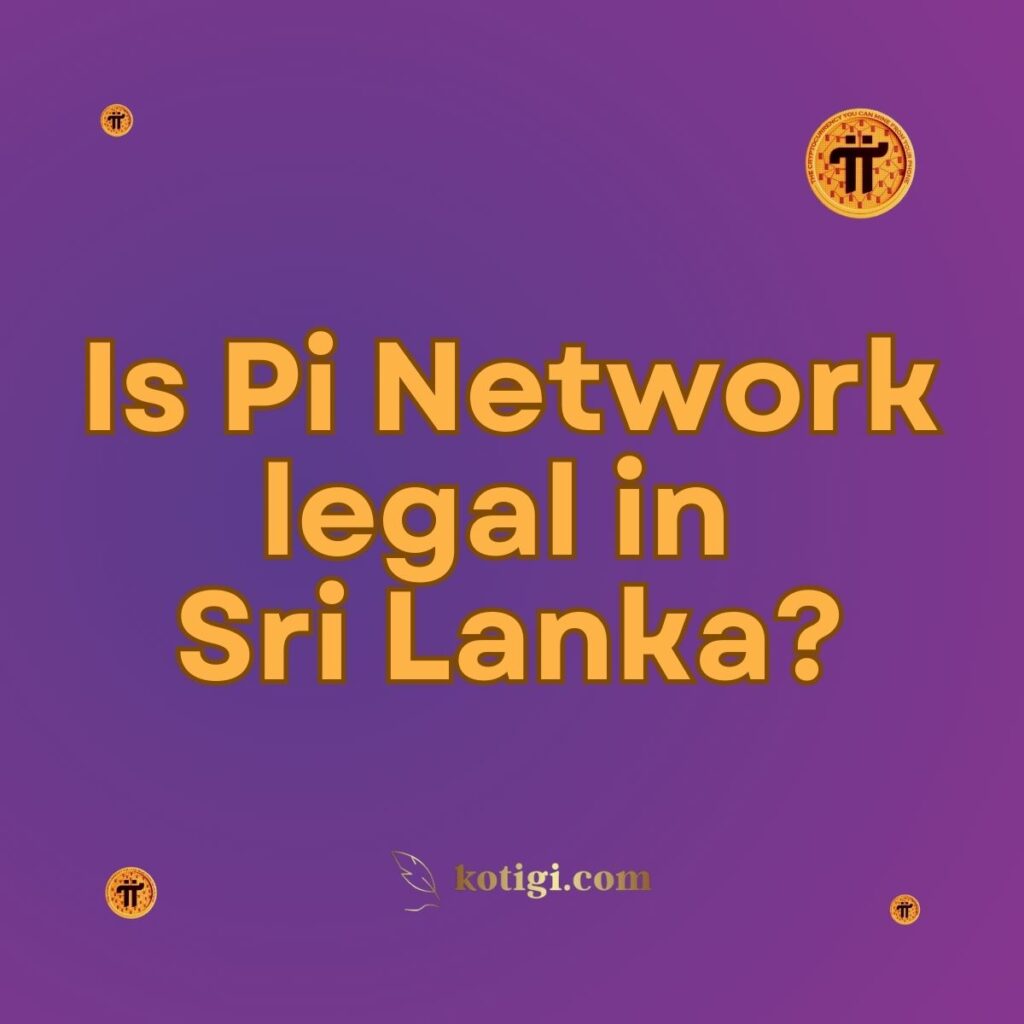
Is Pi Network legal in Sri Lanka?
The legality of Pi Network in Sri Lanka remains uncertain due to the lack of clear cryptocurrency regulations. While there is no outright ban on digital currencies, the Central Bank of Sri Lanka has issued warnings regarding cryptocurrency use. Therefore, Pi Network operates in a legal gray area in Sri Lanka, and users should proceed with caution, staying informed about potential regulatory changes.
Introduction
As Pi Network continues to grow globally, questions arise regarding its legality in various countries, including Sri Lanka. Despite the increasing interest in digital currencies, Sri Lanka has not yet established a clear legal framework governing cryptocurrency use, creating uncertainty for Pi Network users. The Central Bank of Sri Lanka has expressed concerns about cryptocurrencies but has stopped short of issuing a complete ban.
In this article, we will explore the current cryptocurrency landscape in Sri Lanka, examine how Pi Network fits within this environment, and offer guidance for users looking to stay compliant with potential regulations.
Cryptocurrency Regulations in Sri Lanka
No Comprehensive Cryptocurrency Laws
Sri Lanka, like many other countries, has not yet implemented specific laws regulating cryptocurrencies. The lack of formal legislation leaves platforms like Pi Network operating in a gray area where their legal status is not explicitly defined.
While this absence of regulation means that users are not violating any specific laws by participating in Pi Network, it also means that they are not protected by clear legal frameworks, which could lead to future complications.
Central Bank Warnings on Cryptocurrencies
The Central Bank of Sri Lanka (CBSL) has issued public warnings about the risks associated with digital currencies, particularly highlighting concerns over fraud, money laundering, and consumer protection. The bank cautioned that cryptocurrencies are not recognized as legal tender and that users should be aware of the risks involved in dealing with unregulated digital assets.
Although these warnings don’t translate to a legal ban, they do indicate the government’s cautious stance toward cryptocurrencies, suggesting that users should be mindful of potential regulatory shifts in the future.
Pi Network’s Position in Sri Lanka’s Financial Landscape
Pi Network’s Mobile Mining Model
Pi Network operates differently from traditional cryptocurrencies like Bitcoin, as it allows users to mine coins through their mobile devices without the need for high-powered computers or financial investment. This unique model of mobile mining makes Pi Network potentially less likely to face immediate regulatory challenges in Sri Lanka.
Because Pi Network does not involve trading or financial transactions in its current phase, users in Sri Lanka may find it easier to participate without falling afoul of existing regulations. However, this may change as Pi Network evolves and transitions into its open mainnet, when coins become tradable and financial aspects come into play.
Legal Ambiguity
Given Sri Lanka’s lack of cryptocurrency-specific laws, Pi Network remains in a legally ambiguous position. While the platform’s current model of mobile mining could shield it from immediate scrutiny, the absence of regulations means that Pi Network users should remain cautious, particularly as the platform matures and gains wider adoption.
Users should also be aware of the risks associated with operating in an unregulated environment, where sudden legal changes could impact their participation in the network.
Legal Risks for Pi Network Users in Sri Lanka
Potential Future Regulations
While Sri Lanka has yet to regulate cryptocurrencies, this does not mean that it will remain unregulated forever. As the global market for digital currencies continues to grow, governments around the world, including Sri Lanka, are likely to introduce new regulations to address concerns about consumer protection, fraud, and the financial implications of digital currencies.
If Sri Lanka follows this trend, Pi Network users may find themselves affected by new rules and requirements, particularly once the platform reaches its open mainnet phase and introduces financial transactions.
Financial Regulations and Consumer Protection
Sri Lanka’s regulatory focus has traditionally been on consumer protection in financial services. If the government decides to regulate cryptocurrencies, these regulations will likely prioritize protecting users from fraud, scams, and financial risks. Pi Network participants should stay informed about potential legal developments to ensure compliance and avoid any unexpected legal challenges.
International Examples: Regional Regulatory Trends
India’s Approach to Cryptocurrency Regulation
India, Sri Lanka’s neighbor, has taken a varied approach to cryptocurrency regulation. The Indian government has considered both banning and regulating cryptocurrencies, creating uncertainty for digital currency users. Currently, India allows the use of cryptocurrencies but has introduced strict taxation policies and is working on comprehensive regulations.
India’s cautious stance could influence Sri Lanka’s regulatory approach, particularly given their close economic ties and regional influence. Users in Sri Lanka should be aware of these regional trends when considering their involvement in Pi Network.
Pakistan’s Cryptocurrency Ban
In contrast, Pakistan has implemented stricter regulations, with the country’s central bank banning cryptocurrency trading and mining in the formal banking system. This highlights the range of regulatory approaches in the region, from cautionary measures like India’s to outright bans like Pakistan’s.
While Sri Lanka has not yet followed Pakistan’s lead, the potential for stricter regulations remains, and Pi Network users should be prepared for any changes in legal policies.
The Future of Pi Network in Sri Lanka
Growing Interest in Blockchain Technology
Despite the absence of clear regulations, Sri Lanka has shown interest in blockchain technology for its potential to transform industries like finance, logistics, and public administration. The government has announced initiatives to explore the use of blockchain for various applications, which may eventually pave the way for more formal acceptance of cryptocurrencies.
If Pi Network can position itself within this broader interest in blockchain technology, it may find more favorable conditions for growth in Sri Lanka, particularly if the government decides to regulate rather than ban cryptocurrencies.
The Importance of Staying Informed
For Pi Network users in Sri Lanka, it’s essential to stay informed about both local and global cryptocurrency developments. As the platform moves toward its open mainnet, legal considerations will become more significant, and users will need to ensure that they remain compliant with any emerging regulations.
Keeping up with news from both the Central Bank of Sri Lanka and international organizations will help users navigate the evolving legal landscape and mitigate potential risks.
Caution for Pi Network Users in Sri Lanka
Legal Uncertainty and Risks
The lack of formal cryptocurrency regulations in Sri Lanka means that Pi Network users operate in a legal gray area, with no guarantees of legal protection. This can pose risks, especially if the government decides to introduce stricter laws in the future.
Users should proceed with caution, particularly as Pi Network matures and introduces tradable coins, which could attract more regulatory attention. Engaging with the platform in its current phase may be less risky, but future developments could change the legal status of Pi Network in the country.
Monitoring Global and Regional Trends
To stay compliant and mitigate risks, Sri Lankan users should keep an eye on both global and regional regulatory trends. Countries like India and Pakistan are already shaping the region’s approach to cryptocurrency, and similar changes could eventually come to Sri Lanka.
By staying informed about these trends, users can better understand the potential legal challenges and prepare for any new regulations that may affect their participation in Pi Network.
Conclusion
The legality of Pi Network in Sri Lanka is currently uncertain, as the country has not yet introduced formal regulations on cryptocurrencies. While there is no outright ban on Pi Network, users should be aware of the Central Bank of Sri Lanka’s warnings regarding the risks of digital currencies. As Pi Network progresses toward its open mainnet phase, legal challenges could arise, making it essential for users to stay informed about any potential regulatory changes.
In the future, Sri Lanka may develop a clearer framework for cryptocurrencies, but for now, users should approach Pi Network cautiously and remain vigilant about any updates to local laws.
Key Takeaways
- No Clear Regulations: Sri Lanka has not yet established formal cryptocurrency regulations, leaving Pi Network in a legal gray area.
- Central Bank Warnings: The Central Bank of Sri Lanka has issued warnings about the risks associated with cryptocurrencies but has not imposed an outright ban.
- Pi Network’s Current Stage: The platform’s mobile mining system may not attract immediate regulatory attention, but legal risks could increase as Pi Network progresses to its open mainnet.
- Regional Influences: Sri Lanka’s approach to cryptocurrencies may be influenced by neighboring countries like India and Pakistan, which have adopted different regulatory stances.
- Stay Cautious: Users should remain informed about potential future regulations to avoid legal challenges as Pi Network and cryptocurrency adoption grow.





